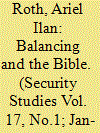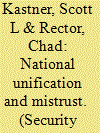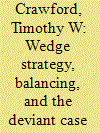| Srl | Item |
| 1 |
ID:
081251


|
|
|
|
|
| Publication |
2008.
|
| Summary/Abstract |
This article uses the case of King Saul, David, and the Philistines, drawn from the Hebrew Bible (books 1 and 2 Samuel), to argue that leaders of states with contested or immature authority structures often elect to prioritize threats to their personal rule over external threats to the integrity and welfare of the states which they lead in a manner not predicted by neo-Realist international relations theory. In making this argument, this article not only makes a contribution to the Realist literature on threat prioritization but introduces a new, novel, and ancient data set which can be used both to generate new theories and to test existing theories within international relations.
|
|
|
|
|
|
|
|
|
|
|
|
|
|
|
|
| 2 |
ID:
081250


|
|
|
|
|
| Publication |
2008.
|
| Summary/Abstract |
This article investigates the determinants of armed group organization and the downstream effects of organization on civil wars. It demonstrates that the interaction between geographical and technological factors influences the types of hierarchical organizations that armed groups develop. It then argues that variations in the types of hierarchies developed by armed groups have important consequences for principal-agent relations, which in turn affect groups' overall level of military effectiveness. Using evidence from field research conducted in Liberia and Sierra Leone, the model's plausibility is examined in comparative case studies of four armed groups that fought in those countries from 1989-2003
|
|
|
|
|
|
|
|
|
|
|
|
|
|
|
|
| 3 |
ID:
081248


|
|
|
|
|
| Publication |
2008.
|
| Summary/Abstract |
Can states that mistrust each other as much as the Peoples' Republic of China (PRC) and Taiwan reach unification agreements? Unification agreements are most feasible when one of two conditions holds: the unification bargain does not independently erode the bargaining power of the weaker state, or the more powerful state can commit credibly not to use its increased bargaining power to restructure the agreement ex post. Our argument accounts for two historical cases-the nineteenth century Argentine and German unifications-and helps to explain why the PRC has found it difficult to make progress on achieving a peaceful bargain with Taiwan. We describe several possible future scenarios for cross-Strait relations and show that democratization in the PRC is not a necessary prerequisite for a unification agreement between the mainland and Taiwan
|
|
|
|
|
|
|
|
|
|
|
|
|
|
|
|
| 4 |
ID:
081249


|
|
|
|
|
| Publication |
2008.
|
| Summary/Abstract |
This study seeks to adjudicate between the two schools of intelligence: the "Orthodox School" which argues that the inherent pathologies and obstacles in the intelligence work make a significant degree of successful surprise inevitable in almost all attempts and the "Revisionist School" which asserts that the roots of surprise attacks lie in avoidable mistakes of certain intelligence officials. By examining the classic case of the Yom Kippur surprise attack, the paper finds the middle ground between the two schools. It distinguishes between the real limits facing analysts and surmountable obstacles. Based on this distinction it determines which problems can be corrected or mitigated and which cannot. It also provides criteria to determine the varying levels of difficulty for predicting attacks. Finally, it finds that intelligence inevitably involves making subjective judgments and utilizing experience correctly, and therefore successful prediction depends on the quality of the analysts
|
|
|
|
|
|
|
|
|
|
|
|
|
|
|
|
| 5 |
ID:
081252


|
|
|
| 6 |
ID:
081247


|
|
|
|
|
| Publication |
2008.
|
| Summary/Abstract |
Wedge strategies seek to divide alliances or to prevent them from forming. Despite their importance in balance of power politics, they have not received systematic attention in security studies. This article corrects that problem. First, it develops a concept of wedge strategy that connects it to balancing behavior and shows how the phenomenon can help to explain "alignment anomalies" in international politics. Second, it mounts an intensive study of the deviant case of Spanish alignment in 1940-41, demonstrating that a British wedge strategy was a necessary and proximate cause of that alignment anomaly, which was an outcome of great consequences for the conduct and conclusion of the Second World War. It concludes by returning to basic conceptual issues, discussing the implications of thinking theoretically about wedge strategies for two facets of international security: the relationship between appeasement and balancing and the power politics of neutrality
|
|
|
|
|
|
|
|
|
|
|
|
|
|
|
|